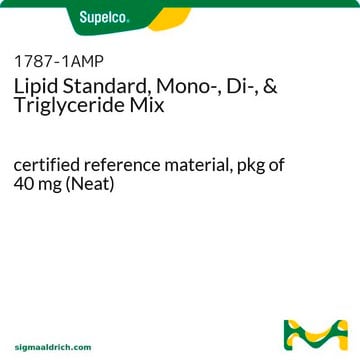LM6005
Avanti
Cer/Sph Mixture II
Avanti Research™ - A Croda Brand
Synonym(s):
Cer/Sph Mixture II, Ceramide/Sphingoid Internal Standard Mixture II
About This Item
Recommended Products
form
ethanol solution
packaging
pkg of 1 × 1 mL (LM6005-1EA)
manufacturer/tradename
Avanti Research™ - A Croda Brand
concentration
~10 μg/mL (Refer to C of A for lot specific concentration. )
application(s)
lipidomics
metabolomics
shipped in
dry ice
storage temp.
−20°C
Application
Packaging
Legal Information
Signal Word
Danger
Hazard Statements
Precautionary Statements
Hazard Classifications
Eye Irrit. 2 - Flam. Liq. 2
Storage Class Code
3 - Flammable liquids
WGK
WGK 1
Flash Point(F)
55.4 °F
Flash Point(C)
13 °C
Choose from one of the most recent versions:
Certificates of Analysis (COA)
Sorry, we don't have COAs for this product available online at this time.
If you need assistance, please contact Customer Support.
Already Own This Product?
Find documentation for the products that you have recently purchased in the Document Library.
Customers Also Viewed
Our team of scientists has experience in all areas of research including Life Science, Material Science, Chemical Synthesis, Chromatography, Analytical and many others.
Contact Technical Service






